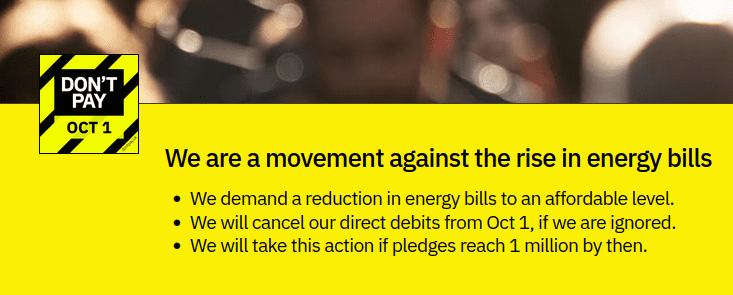By Kamgar Ekta Committee (KEC) correspondent

People from across UK are demanding reduction in the increasing energy prices to an affordable level. Hundreds of people have taken to the streets to protest against the unfair price rise in electricity bills. They have recently started a campaign titled, “Don’t Pay UK”. For the same, people have also started an online signature campaign. The campaign calls for people to stop payment of their electricity bills if their demands are not fulfilled by 1st October and if the campaign reaches 1 million pledges. The average U.K. household fuel bill has risen more than 50% this year, and another increase is due in October,
The energy price cap is set by Ofgem, the energy regulator, and is reviewed twice a year. The energy price cap is a limit on the unit rate that energy suppliers can charge. On 3rd February 2022, Ofgem announced the third consecutive increase in the cap level, from the previous high of £1,277 to £1,971 (hike by £684 which is nearly 54%). It is further expected that this cap will be raised from October 1st to above £3,000, i.e., by more than 82%!!
According to various reports, more than 15 million people across UK will spend more than 10% of their income on energy. It is estimated that by January 2023, more than half the households of UK will be pushed into what they are now calling the “fuel poverty”. Supporters of Ofgem are quoting the rebate of £400 offered by the government as a relief measure. But it is important to note this rebate was announced when the cap levels were estimated to rise at a lower rate. Hence, with the current level of energy cap and prices, even with the rebate more than 80% of the households are going to struggle with their energy bill payments. According to research conducted by a charity called NEA, it is predicted that fuel price crises will force people to live in cold houses and hence lead to an average of 9,700 deaths.
While people and workers are bearing the brunt of the “energy crises”, multinational oil and gas companies continue to be the big winners of rising energy prices. Companies like BP (British Petroleum) Shell and Centrica, the owners of British Gas, have reported record profits in the same period when fuel caps were increased for consumers quoting the ongoing global “energy crises”. BP earned €8.2 billion ($8.45 billion) between April and June, triple what it made in the same period of 2021, while Shell earned £9.4 billion in the same quarter. Centrica saw a profit of £1.3 billion in the first six months of 2022, five times the sum it made in the first half of 2021.
Therefore, to oppose the unfair and unjust increase in fuel prices, thousands of workers, from barristers to train drivers, have staged walkouts. More than 100,000 people have already signed the pledge and the number continues to rise . The campaign has gained a lot of attention not only in the UK but also in other countries. As a result of this, overwhelming support and solidarity from various people from other countries can be witnessed.
Campaigners say that mass non-payment is not a new idea. It happened in the UK in the late 80s and 90s, when more than 17 million people refused to pay the Poll Tax, helping to bring down the government and reversing its harshest measures. Even if a fraction of those who are paying by direct debit stop their payments, it will be enough to put energy companies in serious trouble, and they know this. About 1 million non-payments would cost energy companies an average of £233 million per month in income.
Profiteering by energy companies, whether in the UK or elsewhere deserves to be condemned. An Attack on one is an attack on all!

